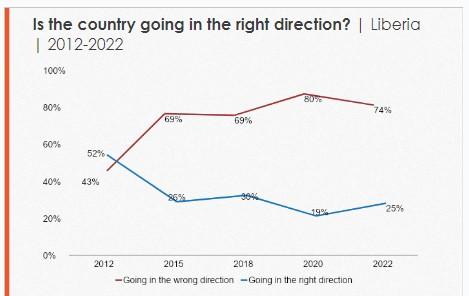Survey says Growing Number of Liberians Eying Green Pastures Abroad

A graph showing how Liberians feel about the country.
“A majority of Liberians say the country is heading in the wrong direction and offer negative assessments of the country’s economic condition and their personal living conditions and close to seven in 10 Liberians have given at least some thought to emigrating,” says Afrobarometer
A growing number of Liberians are thinking about traveling abroad after losing confidence in the country, a survey report from Afrobarometer has disclosed.
Two-thirds or more of all who were surveyed cited limited economic opportunities and the negative direction of the country as driving factors behind their desire to seek better opportunities overseas.
The survey also revealed that many Liberians believe that the lives of those who emigrate often improve compared to those who stay in the country. The results suggest that rising economic hardship and unemployment are the primary drivers of this migration trend.
Experts warn that this trend could lead to a brain drain, with highly skilled and educated individuals leaving the country, resulting in a shortage of human capital and loss of expertise in key industries. This, in turn, could stifle economic growth and development in Liberia.
“A majority of Liberians say the country is heading in the wrong direction and offer negative assessments of the country’s economic condition and their personal living conditions and close to seven in 10 Liberians have given at least some thought to emigrating,” says Afrobarometer who sampled 1,200 people across the country for in its 9th survey report on Liberia.
“More [Liberians] say the country’s economic conditions are worse than a year ago, with few people optimistic that things will be better in 12 months’ time. [Many also] believe that the lives of Liberians who traveled to other countries for an extended period of time got better… much better.”
The survey by Afrobarometer, a pan-African, nonpartisan survey research network, shows that Liberians are becoming increasingly anxious about their future prospects, particularly as the large youth demographic has not translated into opportunities. This has led to a sense of uncertainty and nervousness among the population.
Rich in natural resources, Liberia is, however, one of the poorest countries on earth and has faced significant economic challenges in recent decades that have limited economic opportunities for vast majorities of the politicians, with about 44 percent of the population living under the extreme international poverty line of $1.90 per day, according to the World Bank.
The World Bank also notes that Liberia ranks among the lowest on the United Nations Human Development Index and also suffers from high levels of unemployment, particularly among youth, who lack access to job opportunities.
Liberia's demographic is predominantly youth, with about 60% of its population under the age of 25, and more than a third between the ages of 15 and 34. However, despite this large proportion of young people, there is a growing concern that there are insufficient opportunities for them to improve their livelihoods.
It is projected that by 2030, Liberia's median age will be just 21.4 years, underscoring the urgency of addressing this issue and ensuring that this youthful population has access to the necessary resources and opportunities for a better future.
According to Oscar Bloh, the growing thought in the minds of many Liberians to seek opportunities abroad should serve as a wake-up call to politicians to turn the tide around as soon as possible.
"It is the right of every Liberian to travel but when more are citing an economic reason, it speaks of the reality on grounds in terms of economic opportunities," says Bloh, from the Center for Democratic Governance and contributor to the survey gathering and writing.
"In the future, this would also affect the human resource base of the country; therefore, policymakers should try to address some of the social economic conditions in the country that will make people want to stay to contribute to the socioeconomic development of the country," Bloh added.
Meanwhile, the Afrobarometer survey report revealed Liberians support democracy and reject authoritarian alternatives, but they are not satisfied with the way democracy is working in the country.
The report shows that support for presidential term limits and elections remains high in the country.
It also disclosed that support for multiparty competition has declined considerably over the past decade; as about half of the citizens now say that having many political parties just creates division and confusion.
Meanwhile, the Afrobarometer survey report revealed Liberians support democracy and reject authoritarian alternatives, but they are not satisfied with the way democracy is working in the country.
The report shows that support for presidential term limits and elections remains high in the country.
It also disclosed that support for multiparty competition has declined considerably over the past decade, as about half of the citizens now say that having many political parties just creates division and confusion.
“Support for democracy and rejection of authoritarian alternatives have been consistently high among Liberians over the past decade,” the report says. “A preference for democracy over any other type of political system has increased from 72% in 2008 to 83% in 2020.”
“An overwhelming majority of Liberians agree or strongly agree that the president should be limited to a maximum of two terms in office, a position that has held steady over the past decade.”
According to the survey, nine out of 10 Liberians prefer to choose leaders through regular, open, and honest elections; while “only half of the citizens support multiparty democracy, a 20-percentage-point decline since 2012.”
It added that two-thirds of Liberians describe Liberia as a “full democracy” or a “democracy with minor problems” but six in 10 say they are “not very satisfied” or “not at all satisfied” with the way democracy works in Liberia.
